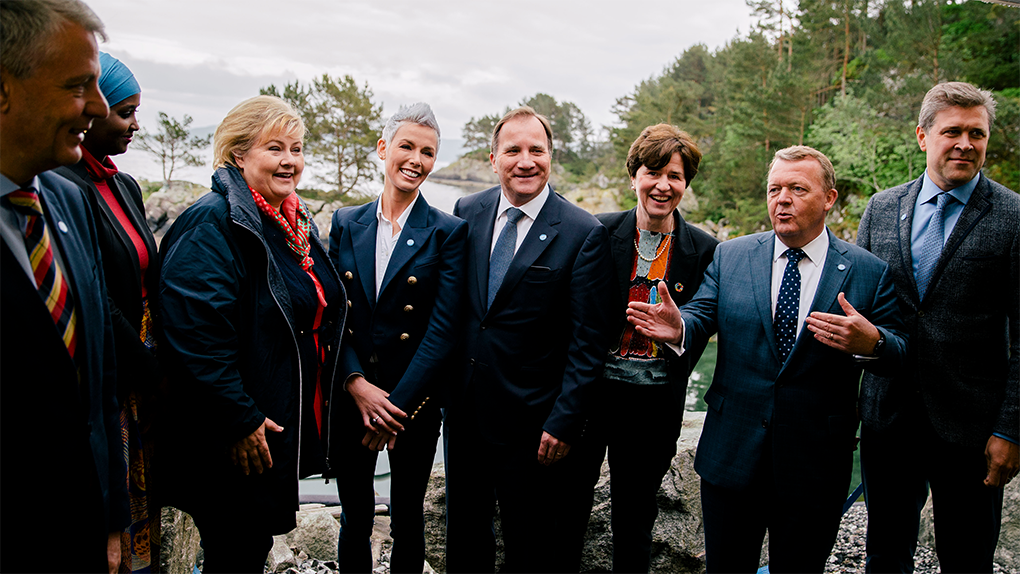
The Prime Ministers of Sweden, Denmark, Finland, Iceland and Norway met in Austevoll outside Bergen this week, to launch a new initiative to share Nordic best practise as means to achieve the UN Sustainable Development Goals. “Nordic Solutions to Global Challenges will be an effective tool in Nordic work to achieve the UN Sustainable Development Goals 2030,” Erna Solberg, Prime Minister of Norway said in a statement.
The Nordic initiative includes flagship projects on themes like green solutions, gender equality, food and welfare, all of which are clearly linked to the UN Global Sustainability Goals outlined in Agenda 2030.
Gunhild Stordalen was invited to give her remarks on the focus on Nordic food. “Nordic Food Solutions can be a potent medicine to global challenges,” Gunhild stated, “but it would make a much better sell if you could back this with your own results”.
When questioned later, the Swedish Prime Minister, Stefan Løfven replied, “Stordalen’s challenge is very good and relevant. (Food) is something we need to address much more”. The Norwegian Prime Minister stated: “We need to make it much easier for modern families to cook healthy and sustainable in their daily lives”.
Read Gunhild Stordalen’s full remark here:
Dear Prime Ministers, dear colleagues & friends
More than 2,000 years ago, Hippocrates said ”let food be your medicine”. He was right. Food can be a potent medicine to global challenges – and way beyond health.
Obviously, getting it right on food won´t solve everything. But a global shift – towards diets that are both healthy and sustainable – is a pre-requisite for achieving all the Sustainable Development Goals.
Therefore, I am very excited by your visionary focus on food as part of your ‘Nordic Solutions’–initiative
But, as a physician, I need to ask: Can we prescribe Nordic Food as a solution, without solid proof that the medicine actually works?
The Nordic countries top world rankings on health, sustainability, equality. Still, food is part of the problem, not the solution. Like in the rest of the world, rates of obesity & diet-related diseases are increasing.
Unhealthy diets are now posing a greater threat to public health than tobacco!
And the way we currently produce & waste our food is far from sustainable, being a main driver of climate change & environmental problems. What we need is a coherent food & agricultural policy, linking what we produce to what we should eat.
You have already taken an important, first step by integrating sustainability in the Nordic Dietary Guidelines. Which is great! – If we actually followed them! Because right now, the majority of us are still eating too much meat, sugar & salt, and too little fish, vegetables & whole grains.
If we closed this gap, between vision and action, we could save lives and emissions
As well as lots of money: Estimates for Norway suggests that if everyone followed the national guidelines, the economic benefits to society could exceed 150 billion kroner – each year!
–and that is before adding the costs savings to the environment!
But to make healthy & sustainable food affordable, attractive and convenient for everybody
the guidelines will have to be implemented in all policy – from agricultural subsidies to consumer incentives
Of course, this isn’t done overnight, but like you have shown before, Like the ambitious goals of achieving carbon-neutrality set by Finland and Sweden, you can set clear, ambitious targets for when & how to bend the curves.
In addition, I think you could do the following:
First, walk the talk in your own public kitchens! We can´t dictate consumer choices.
But when you serve millions of daily meals – for your elderly, your patients, your soldiers, and your school children – the choice is all yours! You´ve got lots of success stories. So share best practice amongst you, and set your own Guidelines as the standard for all public procurement!
Second, start fertilize innovation! According to food entrepreneur Kimbal Musk, “Food is the new internet”.
And I believe the Nordics can become the Silicon Valley of future food. You can boost the development of tasty solutions just by setting health & sustainability criteria as basic requirement for all start-up funding!
And third, help fill the knowledge gaps: We know the rough outline – that we need to shift to more plant-based diets, we are still lacking the exact formula for how to feed a growing world population within the Planetary Boundaries.
For climate, we have an Intergovernmental Panel – an IPCC – that has enabled us to set the 2 degree target
Currently, there is no IPCC for the food system, and thereby no science-based target for decision makers.
So – in addition to invest in new interdisciplinary research – what if we established a global research hub, here in the Nordics? To syntheize & drive the knowledge needed to find the “2 degree equivalent” for food?
Let me know if you are interested, EAT is keen to help!
Dear Prime Ministers, congratulations with the launch of an ambitious initiative. There´s no doubt, that between the 5 of you, you have the opportunity, the power and the mandate to export food as a medicine to Global Challenges. But remember, it makes a much better sell if you can back this with your own results.
Because if we can´t make it here – how can we make it anywhere?